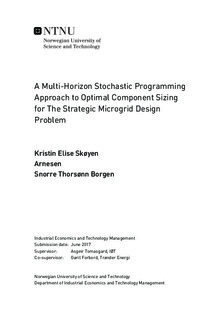A Multi-Horizon Stochastic Programming Approach to Optimal Component Sizing for The Strategic Microgrid Design Problem
Abstract
This thesis studies the strategic microgrid design problem, and suggests a multi-horizon stochastic programming approach aiming to provide decision makers with valuable insights into the optimal component sizing in a stand-alone microgrid including renewable energy sources and energy storage systems. The components considered are photovoltaic panels, wind turbines, batteries and diesel generators.
The strategic microgrid design problem is subject to uncertainty in load demand, and in weather conditions, and due to modelling of the physical properties of components, it is a mixed integer problem. We present a novel approach to the strategic microgrid design problem, including the consideration of uncertainty in input parameters, component specific modelling, and the evaluation of long strategic horizons. Other important contributions are the inclusion of battery lifetime considerations and the possibility of reinvestments in battery units. The objective of the model is to provide a suggested investment decision, given as a number of specific types of components.
We propose to model the uncertainty with a multi-horizon information structure, separating the operational and strategic horizon of the problem. Exploiting the multi-horizon information structure, we design a scenario tree with representative profiles for predefined seasons in an effort to limit the size of the problem. The stability of the model is verified, and the decreased size of the problem facilitates for solving more realistic instances.
The computational performance is further improved by applying an alternative diesel generator formulation, leading to an average improvement in computation time for the smaller instances of more than 90\% compared to the original formulation. The improvement is achieved without compromising the quality of the results. To further overcome the computational challenges faced by the problem, we propose a variety of speed-up strategies. The most promising approaches are a matheuristic, and applying a \textit{Newton-Barrier} algorithm for the LP-relaxation, combined with an aggressive cut strategy.
The thesis gives a thorough introduction to the considerations necessary in a strategic planning phase of a microgrid. The main contribution is a novel mathematical model for the strategic microgrid design problem with a multi-horizon information structure, proven to perform as intended. In addition to this, we present a scenario generation algorithm that is shown to be stable with a given set of parameters, as well as numerous ways of improving the computational performance of the problem.
